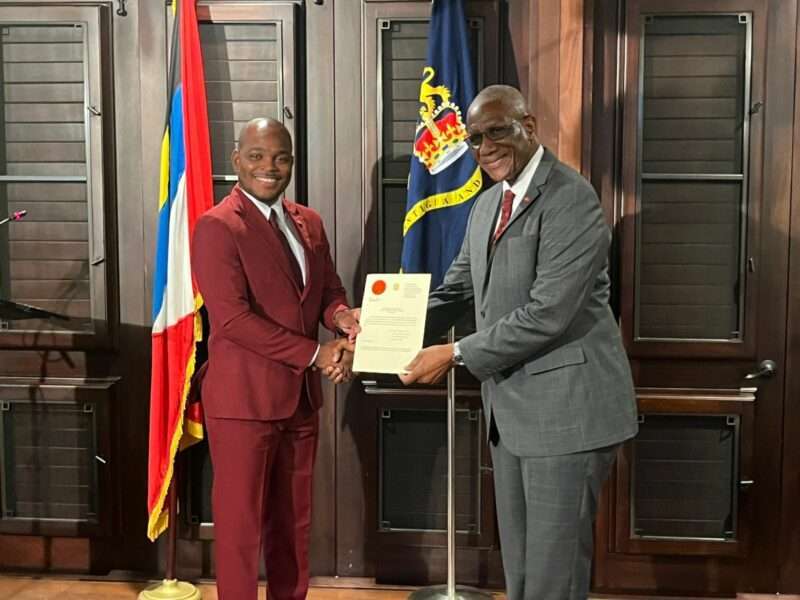You can now listen to Antigua News articles!

Senator Michael Joseph and Governor General Rodney Williams
By Kieron Murdoch | Opinion Contributor
On Monday, Michael Joseph was sworn in as a government Senator and as Minister of State in the Health, Wellness and Social Transformation Ministry. Perhaps one of the most promising amongst the nation’s younger politicians on either side, Joseph has often earned the praise of various observers who have acknowledged his ability, and more so, his character.
As we join others in congratulating Senator Joseph on his appointment, we encourage him and others of his generation to do their utmost to preserve their character despite how difficult such a task tends to become, the higher they ascend in politics, and the deeper they get into the inner circle of their political chosen party.
It is cliche to speak of the promise brought on by new generations of political leaders. That is something people say, but it is not necessarily always the case. Antigua and Barbuda does not simply need newer leaders on either side, but rather, it needs leaders who are committed to doing the job better than their predecessors. That means we need leaders who are willing to acknowledge their predecessors’ mistakes.
Very often, our political culture and the machinery of party politics can and does wear down the best society has to offer. In this vein, there are many many examples of people who build themselves up through hard work and good principles only to have those principles assailed on a daily basis when they enter politics and assailed by what others tell them is political necessity.
A person may be told that the only way to reach the heights at which they can be as impactful as they wish to be is to toe a party line (whichever) and come to terms with the often ruthless or unscrupulous nature of politics. A person may be told that holding on to principles will not get them anywhere. They will be told that they simply must compromise.
The paradox is in that when a person takes that approach, they risk losing whatever strength of character that helped make them stand out in the first place. If they refuse to compromise and hold steadfastly to principles instead, they become an outlier who is less attractive to work with within a party (whichever) and apparently less attractive to us, the electorate, who love to be feted with inducements by the people who seek to represent us.
In this way, we tend to wear down political aspirants and drive them into conformity by offering rewards for toeing the line and reprimands for making a fuss. Those who are part of the new generation in politics nonetheless need to aim for change, as opposed to being satisfied with the status quo.
Sure, faces are changing rapidly on both sides. But does new blood in any way guarantee that something will be done differently? The last election gave the Antigua and Barbuda Labour Party (ABLP) a chance to open up its slate after various incumbents lost their seats, and some of its winners are now preparing for retirement. The United Progressive Party (UPP), having lost the election, has a slate that remains largely open to shifts and changes, since the majority of its candidates were not successful.
And still, neither party seems to be experiencing any process of significant change at the moment as regards their underlying moral values and their desire to radically improve upon governance issues or commit to better politics, despite the new blood coming in. It really does appear to be a lot of the same.
Our parties need new leaders who are willing to openly challenge the political culture within their parties, and challenge the glaring deficiencies in the way Antigua and Barbuda has been governed for the past five decades. If they are unwilling to do so, it is arguable that they are merely supporting the status quo.
Perhaps we should hear our younger generation of political leaders talking about issues that their predecessors often refused to discuss, instead of giving us the exact same rhetoric that we have swallowed for so many years. Perhaps we need to hear them speaking about a new, highly planned approach to development control, zoning, and physical planning.
Perhaps they need to be speaking about the future of the civil service and correcting the myriad of issues that persist there, as opposed to absolving themselves as their predecessors have, and simply saying “that’s just the way it is”. Perhaps they need to be speaking about shaking up the police force – better recruiting standards, higher pay, adequate premises, and independent oversight.
Perhaps they should be speaking about addressing corruption and not pretending as if the concept does not exist – a habit perfected by successive generations of leaders and the current generation, unless and until it is politically convenient to discuss the topic.
Perhaps we need to hear them addressing constitutional reform and the improvement of checks and balances in our democratic and electoral framework – again, something that successive generations of leaders have refused to adequately or routinely address. Perhaps we need to hear them having serious discussions about the economy and impact of years of similar government policies on growth.
Perhaps we would benefit from a new generation of leaders who are actually interested in calling out the obvious inefficiencies in our healthcare, social services, and education systems, and not merely when they are in opposition, but when they are part of the governing party as well. And not merely for the sake of pointing a finger, but with a view to actually proposing solutions.
Perhaps we require a new generation of leaders who have had their fill of handout politics and are committed to rejecting the demands citizens wrongfully place on them to fund any and everything from their own pockets in exchange for political favour, or to demonstrate that they are “doing something”, as people say.
The country needs its new leaders to want to achieve something more, and not to be eternally satisfied with the direction of things as they are. If those stepping up to the crease today are not willing to discuss these issues and make them paramount, then where will we be in another 40 years?
Similarly, each of us must also be willing to accept and defend such rare leaders when they come around, especially when their political tribe rejects them for being idealistic, as they often do, rather than wallowing in our slavish devotion to a party (whichever).
About the writer:
Kieron Murdoch worked as a journalist and later as a radio presenter in Antigua and Barbuda for eight years, covering politics and governance especially. He is an opinion contributor at antigua.news. If you have an opinion on the issues raised in this editorial and you would like to submit a response by email to be considered for publication, please email staff@antigua.news.
























0 Comments